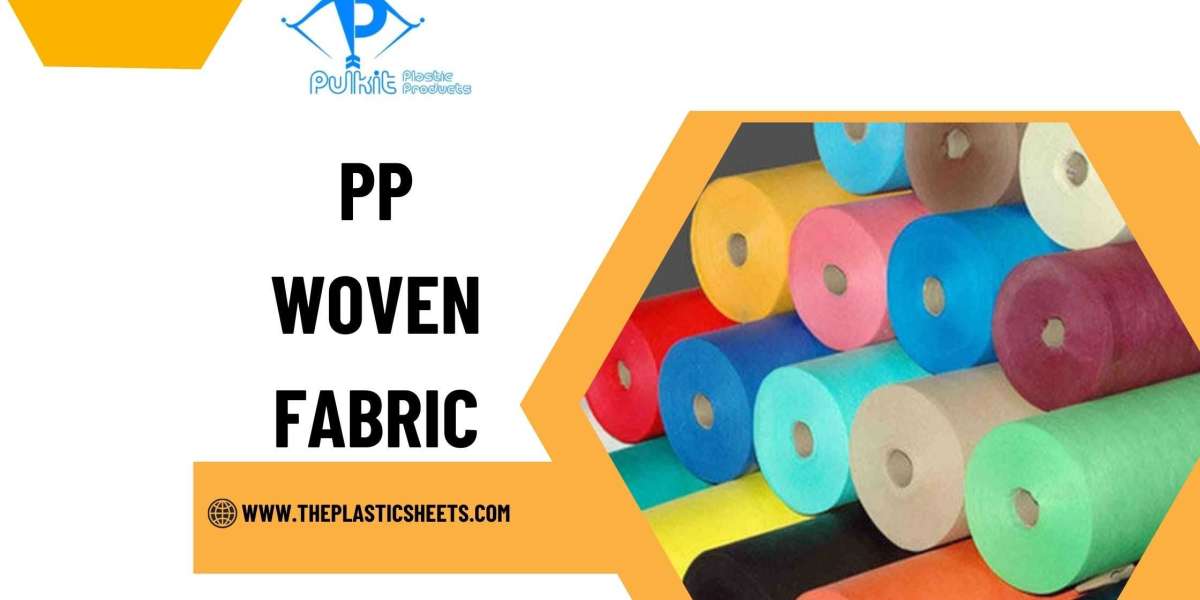Polypropylene (PP) woven fabric is a popular material used in a variety of industries for its strength, durability, and versatility. Whether you're involved in manufacturing, agriculture, packaging, or any other industry that requires durable fabric, PP woven fabric is an essential choice. In this article, we will dive into everything you need to know about PP woven fabric, its properties, applications, manufacturing process, and how companies like Pulkit Plastic Products play a significant role in the industry, especially among the Polypropylene fabric manufacturers in India.
What is PP Woven Fabric?
PP woven fabric, made from polypropylene, is a type of textile made by weaving polypropylene fibers. This fabric is renowned for its high tensile strength, resistance to chemicals, and ability to withstand a variety of environmental conditions. The fabric is woven in a way that allows it to be used in many applications, from industrial packaging to agricultural products, making it a versatile material.
Polypropylene itself is a thermoplastic polymer that is known for its low cost, lightweight nature, and durability. When woven into fabric, it creates a material that is strong yet flexible, making it ideal for both indoor and outdoor applications.
Key Properties of PP Woven Fabric
PP woven fabric offers a range of unique characteristics that make it suitable for different purposes. Some of the most important properties include:
Strength and Durability: PP woven fabric has a high tensile strength, meaning it can handle heavy loads and is resistant to tearing. It is also resistant to moisture, UV rays, and chemicals, which gives it a longer life compared to other fabrics.
Lightweight: While durable, PP woven fabric is relatively lightweight compared to other materials, making it easier to transport and handle. This makes it a preferred choice for packaging, bags, and other items that require a balance of strength and lightness.
Water Resistance: One of the standout features of PP woven fabric is its water resistance. It does not absorb water, which prevents mildew and mold growth, ensuring that the fabric remains functional and durable even in humid environments.
Environmentally Friendly: Polypropylene is a recyclable material, and PP woven fabric can be recycled and reused. This makes it an environmentally responsible choice for those looking to reduce waste.
Customizable: PP woven fabric can be customized in terms of color, thickness, and texture, allowing it to meet specific requirements for various industries.
Manufacturing Process of PP Woven Fabric
The process of manufacturing PP woven fabric involves several key steps, each of which ensures that the final product meets the necessary standards for strength, durability, and functionality.
Polypropylene Resin Production: The process begins with the production of polypropylene resin. Polypropylene pellets are created from crude oil, which is then polymerized into polypropylene granules.
Extrusion: The polypropylene granules are melted and extruded into thin fibers or filaments. These fibers are the building blocks of the fabric and are what give the final product its strength and flexibility.
Weaving: The extruded polypropylene fibers are woven into fabric using a loom. This step involves interlacing the fibers in a specific pattern to create the desired strength and texture. The weaving process can be adjusted to produce different weights and densities of fabric, depending on the end use.
Finishing: After weaving, the fabric goes through a finishing process that can include coating for added water resistance, printing, and other treatments to improve the fabric's appearance and functionality.
Applications of PP Woven Fabric
PP woven fabric is used in a variety of industries due to its versatility. Some of the most common applications include:
Packaging: PP woven fabric is widely used in the packaging industry. It is used to create durable bags for items like cement, fertilizers, grains, and other bulk goods. These bags are strong enough to hold heavy loads and protect the contents during transportation.
Agriculture: In agriculture, PP woven fabric is used for items such as crop covers, shade nets, and bags for storing harvested crops. It helps protect plants from harsh weather conditions and pests while allowing airflow and sunlight.
Construction: PP woven fabric is used in the construction industry for applications such as geotextiles, which are used to separate, filter, and reinforce soil. This fabric helps prevent erosion and stabilizes the soil in construction sites.
Storage: PP woven fabric is used to make large, durable storage bags for goods that need to be stored in bulk, such as grains, sand, and chemicals. The fabric is strong enough to protect these goods from external elements.
Protective Covers: PP woven fabric is used to make covers for outdoor items like furniture, machinery, and vehicles. These covers protect against dust, rain, and UV rays, extending the lifespan of the items being protected.
Shopping Bags: Due to its durability, PP woven fabric is also used to manufacture eco-friendly shopping bags that can hold heavy loads while being lightweight.
PP Woven Fabric Manufacturers in India
India is one of the largest producers of PP woven fabric globally. The country has a robust manufacturing infrastructure, with several polypropylene fabric manufacturers producing a wide range of products to meet the demands of different industries. Among the notable players in the market, Pulkit Plastic Products stands out as a reliable and trusted manufacturer of PP woven fabric. They produce high-quality PP woven products that cater to both domestic and international markets.
As one of the leading PP woven fabric manufacturers, Pulkit Plastic Products focuses on delivering durable, environmentally friendly, and customizable solutions to meet the specific needs of its clients. Their commitment to quality and customer satisfaction has earned them a solid reputation in the market.
Conclusion
PP woven fabric is a versatile, durable, and cost-effective material that is used in various industries across the world. Its strength, water resistance, and recyclability make it an ideal choice for applications ranging from packaging to agriculture and construction. Companies like Pulkit Plastic Products, among the leading polypropylene fabric manufacturers in India, play a crucial role in supplying high-quality PP woven fabric to meet the demands of diverse industries. Whether you're involved in manufacturing or simply looking for durable fabric solutions, understanding the properties and applications of PP woven fabric can help you make an informed decision.
FAQ
1. What is the difference between PP woven fabric and non-woven fabric?
The main difference lies in the manufacturing process. PP woven fabric is made by weaving polypropylene fibers together, creating a fabric with high tensile strength. Non-woven fabric, on the other hand, is made by bonding fibers together without weaving, often using heat or chemicals. PP woven fabric is stronger and more durable compared to non-woven fabric.
2. Is PP woven fabric recyclable?
Yes, PP woven fabric is recyclable. Polypropylene is a thermoplastic material, meaning it can be melted down and reused. This makes it an environmentally friendly option, especially in industries looking to reduce waste.




